Celebrating resident researchers
» Go to news mainFaculty of Medicine resident research awards presented June 7
On June 7, it was a day dedicated to honoring the accomplishments of Dalhousie's resident researchers. Of the 33 nominations received, five resident physicians were honoured with research awards, while seven others received scholarships.
Dr. David Anderson, Dean, Faculty of Medicine joined fifty residents, staff, and faculty, including, Dr. David Bowes, Assistant Dean, Postgraduate Medical Education, at the Collaborative Health Education Building (CHEB) and online to recognize to recognize the dedication of all the nominees and celebrate the award recipients. Dr. Anna MacLeod, social scientist and Dalhousie researcher, gave the keynote address.
“It was truly inspiring to learn more about the projects honoured with Resident Research Awards this year,” says Dr. MacLeod. “Engaging in research of such high calibre while juggling the demands of residency is an impressive feat, and the recipients of these awards have set a very high standard, excelling in both clinical practice and scientific inquiry. The future is bright!”
Clinician scientists play a critical role in advancing medical knowledge, improving patient care, and fostering innovation. By continuing research as practicing medical doctors, these physicians are uniquely positioned to lead the way to substantial improvements in clinical practice, service delivery, health policy and other aspects of health care. At Dalhousie, opportunities for residents to engage in research, such as those afforded by these awards and grants, and others such as the Clinician Investigator Program (CIP), allow residents to develop the skills and experience to prepare them for a career as a clinician scientist.
“As a faculty it is important to recognize our residents' research,” says Jennifer Acuna, curriculum specialist in the Medical Education Teaching and Research Office in Postgraduate Medical Education. “It is vital for advancing medicine, honoring their contributions, and inspiring a culture of innovation in healthcare.”
Resident research award winners received between $1,000 and $1,500 prizes, while scholarships recipients received between $10,000 and $30,000 for their work.
Meet the 2023 resident research award and scholarship recipients:
Award Winners
Dr. Mark MacLean: Best Work in Basic Science Research

Resident Physician (PGY-5), Department of Surgery, Division of Neurosurgery
Project: NMDA-Receptor Antagonism for the Prevention of Neurological Dysfunction in Traumatic Brain Injury: Results of a Randomized Pre-Clinical Trial
Amount: $1,000
Repetitive head impacts are commonly experienced by contact sport athletes and have been associated with short-and long-term problems with thinking, memory, and mental health. Mechanisms responsible for the development of complications following repetitive head impacts remain unclear and require further study. In this study, Dr. MacLean investigated the effects of a drug called memantine on a brain phenomenon called cortical spreading depolarization (CSD), which is associated with traumatic brain injury (TBI) and poor outcomes. He found that memantine significantly reduced the occurrence of CSD and its impact on brain activity in animals with TBI. In a randomized trial, animals treated with memantine showed better resilience to injury and higher neurological scores compared to the control group. These findings suggest that memantine may have potential as a preventive treatment for complications following TBI.
Dr. Yolanda Evong: Best Work in Clinical Science Research
 Resident Physician (PGY-3), Department of Pediatrics
Resident Physician (PGY-3), Department of Pediatrics
Project: Assessing the impact of restricted palivizumab access on severe Respiratory Syncytial Virus (RSV) illness rates among previously eligible preterm infants in Nova Scotia.
Amount: $1,000
Respiratory Syncytial Virus (RSV) is a common cause of lung infections in young children, often leading to hospitalization. Palivizumab (PZ) is a drug used to prevent severe RSV infections, but its high cost limits its availability to certain high-risk groups. In 2016 Nova Scotia changed its eligibility criteria for PZ, stopping its use in otherwise healthy infants born after 30 weeks' gestation. Dr. Evong’s study assessed the impact of this policy change and found that infants born between 30 and 32 weeks' gestation after the policy change were over 10 times more likely to be hospitalized for RSV infections compared to those born before. These findings emphasize the need to re-evaluate the cost-benefit balance of PZ guidelines and provide feedback for policymakers to optimize eligibility criteria.
Dr. Bonnie He: Best Work by a Junior Resident
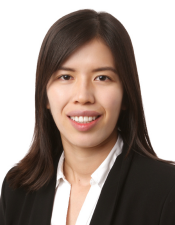 Resident Physician (PGY-2), Department of Ophthalmology and Visual Science
Resident Physician (PGY-2), Department of Ophthalmology and Visual Science
Project: Risk of acute angle closure with bisphosphonate use in patients with osteoporosis
Amount: $1,000
Over the past decade, there have been literature reports suggesting an association between bisphosphonate (BP) use and glaucoma. In the absence of large epidemiologic studies however, this relationship remains uncertain. Dr. He’s study aimed to investigate the association between BP use and acute angle closure (AAC), a type of glaucoma, using a large health claims database. She conducted a retrospective cohort study on osteoporosis patients in the United States from 2008 to 2018 and found that patients on BPs had a higher risk of developing AAC compared to non-users, and specifically, those on risedronate had a higher risk compared to other types of bisphosphonates. With the prevalence of osteoporosis, and the wide use of bisphosphonates for its management, these findings have significant public health implications given the potential for serious vision loss.
Dr. Cameron Ashe: Best Work in Quality Improvement
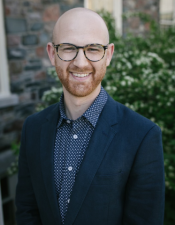 Resident Physician (PGY-3), Department of Medicine, Division of Internal Medicine
Resident Physician (PGY-3), Department of Medicine, Division of Internal Medicine
Project: Is there a Delay in Timely Access to CT scans for the Diagnosis of Lung Cancer? A QI Project
Amount: $1,000
Lung cancer is the most lethal cancer in New Brunswick, but nearly half of patients have advanced disease when it is first diagnosed. Therefore, early recognition and treatment is essential to improve symptoms and survival. Dr. Ashe conducted a study at the Saint John Regional Hospital aimed to assess the baseline time interval between suspicious chest X-rays (CXRs) and CT scans in lung cancer patients. The analysis found that 81 per cent of patients received CT scans within the recommended two-week interval when the CXR was reported as suspicious for malignancy. The challenge, they found, lies in prioritizing patients with non-specific findings on their initial CXR, who often fall under semi-urgent category for CT imaging according to guidelines. These patients had a median CT interval of 32 days, indicating that the target was met for many patients. Shortening the time interval for patients with non-specific presentations would require rethinking resource allocation and acceptable wait time targets.
Dr. Anna Duncan: Best Overall Award Winner
 Resident Physician (PGY-4), Department of Surgery, Division of Plastic Surgery
Resident Physician (PGY-4), Department of Surgery, Division of Plastic Surgery
Project: The effect of silver on re-epithelialization, infection, and hypertrophic scarring of partial thickness burns in pediatric patients: A randomized control trial
Amount: $1,500
Superficial pediatric burns are best treated with dressings that can be left on while the burn heals, as this minimizes discomfort for the patient. It has long been thought that these dressings had to have silver in them to prevent infection. Dr. Duncan compared two groups of pediatric burn patients, one treated with a silver-based dressing and one without. The dressings were otherwise identical in nature and neither the doctor treating the patient, nor the patient knew which type of dressing they were assigned. She and her team assessed rate of infection, time to healing, and risk of poor scarring at two and six months after their burn. They then compared these outcomes between the two groups and found that there was no difference and that infections are very rare. This research shows that silver is not necessary and should be used sparingly. There is some research that suggests silver slows healing, but Dr. Duncan did not find this in her study.
Scholarship Winners
Dr. Andre Pollmann: Killam Scholarship
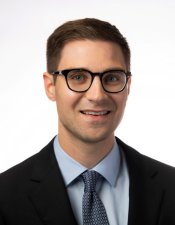 Resident Physician (PGY-5), Department of Ophthalmology and Visual Science
Resident Physician (PGY-5), Department of Ophthalmology and Visual Science
Amount: $30,000
The Killam Scholarship will sponsor Dr. Pollmann’s one-year fellowship in cornea and external eye disease at the Université de Montréal. This one-year clinical ophthalmology fellowship provides subspecialty training in the diagnosis and surgical management of diseases of the cornea and ocular surface. Dr. Pollmann aims to develop expertise in different types of corneal transplantation surgeries that can help restore vision for patients impacted by a wide range of eye diseases. He will receive additional surgical training in repair of traumatic eye injuries and management of ocular surface tumors. The fellowship will also have a research component and Dr. Pollmann will be examining the cost-effectiveness and quality-of-life outcomes of ultraviolet laser and refractive surgery in patients with keratoconus, a common eye disorder that affects young adults and can lead to vision loss through progressive changes in corneal curvature and scarring.
Dr. Joel Bierer: Killam Scholarship
 Resident Physician (PGY-4), Department of Surgery, Division of Cardiac Surgery
Resident Physician (PGY-4), Department of Surgery, Division of Cardiac Surgery
Amount: $20,000
The Killam Scholarship was established to build Canada’s future by encouraging advanced research. The scholarship will support Dr. Bierer in studying health outcomes for infants and children with congenital heart disease. Surgery remains the gold standard for many types of heart disease diagnosed in childhood, however, inflammation during the surgery can lead to prolonged recovery in the intensive care unit and the hospital. Dr. Bierer is leading a multi-phase research initiative that aims to better understand the inflammatory reaction during children’s heart surgery and characterize anti-inflammatory therapies to enhance post-operative recovery. Effective treatments that dampen inflammation and promote a healthy recovery are of great importance for patients, their families, and the health care system. The support granted by the Killam Scholarship will facilitate this important research and potentially lead to changes in clinical care for children with congenital heart disease.
Dr. Sean Rasmussen: Killam Scholarship
 Resident Physician (PGY-5), Department of Pathology
Resident Physician (PGY-5), Department of Pathology
Amount: $15,000
The Killam Scholarship will support Dr. Rasmussen’s pursuit of a fellowship in surgical pathology from Western University in London, Ontario. His focus will be on subspecialty training in gastrointestinal pathology, as well as head and neck pathology. The pathology team in London includes world-renowned experts, and they have strong research programs in these subspecialty areas with emerging expertise in digital pathology. Following this subspecialty training, Dr. Rasmussen will be returning to Halifax to begin his career here.
Dr. Connor McGuire: Samuel R. MacLaughlin Scholarship
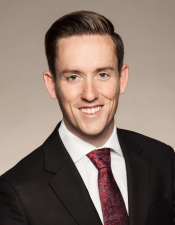 Resident Physician (PGY-5), Department of Surgery, Division of Plastic Surgery
Resident Physician (PGY-5), Department of Surgery, Division of Plastic Surgery
Amount: $20,000
In 2001, the Samuel R. McLaughlin Foundation donated $500,000 to Dalhousie as a final gift before closing its doors permanently. The purpose of the fund is to support medical fellowships, medical training or research or other medical education programs. The scholarship will help fund Dr. McGuire’s fellowship plans in craniofacial and aesthetic surgery. With eventual plans to hopefully return to work in Atlantic Canada, this scholarship will allow him to learn from masters in the field and bring new techniques back to the Maritimes. Having this financial support will also allow Dr. McGuire to participate in more national and international conferences where he will present his research and gain new ideas from colleagues.
Dr. David Forner: Samuel R. MacLaughlin Scholarship
 Resident Physician (PGY-5), Department of Surgery, Division of Otolaryngology - Head & Neck Surgery
Resident Physician (PGY-5), Department of Surgery, Division of Otolaryngology - Head & Neck Surgery
Amount: $30,000
The Samuel R. MacLaughlin Scholarship will provide funding in support of Dr. Forner’s Head and Neck Oncology and Microvascular Reconstruction Fellowship at the University of Michigan. As one of the most well-regarded training programs for head and neck surgical oncology, the University of Michigan program offers what many seek in a surgical fellowship: exceptional training in advanced surgical techniques, expansion of research acumen, and innovation in surgery and education. The Michigan fellowship focuses on training complete surgical oncologists – those who work in a multidisciplinary, collaborative setting alongside radiation and medical oncologists, and many essential allied health professionals. Head and neck cancer is a devastating disease that can render patients unable to eat, speak, or breath – the Michigan fellowship teaches the skills needed to both treat this cancer and restore damaged function.
Dr. Colleen O’Connor: Ross Stewart Smith Fellowship in Medical Research
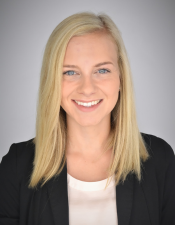 Resident Physician (PGY-4), Department of Pediatrics
Resident Physician (PGY-4), Department of Pediatrics
Amount: $10,000
The Ross Stewart Smith Fellowship in Medical Research supports Dr. O'Connor's research for her Master's degree in Health Professions Education from the University of Western Australia. Her thesis focuses on feedback literacy, which refers to trainees' skills, attitudes, and behaviors in understanding and effectively using feedback. Collaborating with Professor Elizabeth Molloy in Melbourne, they used qualitative methodology to explore trainees' feedback experiences in clinical settings and their application of feedback literacy skills. This research is relevant in Competency-Based Residency Training, where frequent feedback is increasingly common. The findings can inform curriculum design to enhance trainees' feedback literacy for optimal learning in clinical settings.
Dr. Bernard Burgesson: Ross Stewart Smith Fellowship in Medical Research
 Resident Physician (PGY-5), Department of Surgery, Division of Orthopaedic Surgery
Resident Physician (PGY-5), Department of Surgery, Division of Orthopaedic Surgery
Amount: $10,000
The Ross Stewart Smith Fellowship in Medical Research will support Dr. Burgesson’s current research on the disparities in access to orthopaedic surgery care. Demographic disparities in access to surgery and outcomes remain pervasive throughout the healthcare system. Access to healthcare services and surgery continues to lag among minority and marginalized populations. In orthopaedics, investigations have uncovered similar trends, but little is known about the current state of orthopaedic surgery utilization in Canada. Dr. Burgesson’s objective is to assess local and national rates of knee and hip arthroplasty utilization to identify any disparities in the Canadian population. He plans to complete and publish his findings in the summer of 2024. The scholarship will also support his future master’s in public health, which he plans to undertake upon completion of his surgical training.
Recent News
- Dalhousie’s first physician assistant cohort steps into Nova Scotia’s healthcare system
- Dalhousie med students explore pediatric care in Austria
- Dalhousie researchers shine at Discovery Awards with four top honours
- New $2M national study to uncover how biology, social factors shape MS outcomes
- Pathology EDIA Committee makes strides during 2024‑2025 year
- CCfV’s impact on vaccine innovation
- Unlocking the secrets of memory—with fruit flies
- Celebrating mobility research and the power of philanthropy
